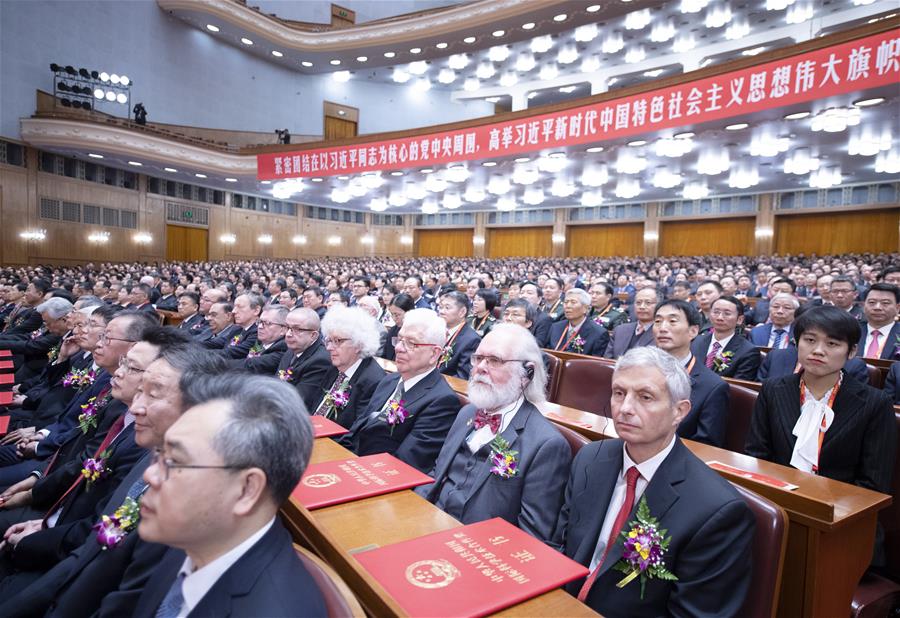China's top scientific award for foreign scientists given to 10
By ZHANG ZHIHAO | chinadaily.com.cn | Updated: 2020-01-10 17:01

China has granted its 2019 International Science and Technology Cooperation Award, the nation's highest scientific honor for foreign scientists, to 10 foreign scientists from eight countries on Friday.
Both the number of recipients and their countries of origin represent record highs. This award recognizes the key roles foreign scientists have played in China's scientific development as well as China's growing effort to diversify its scientific partners in recent years, according to the National Office for Science and Technology Awards.
Of the 10 winners, three are from the United States, while the United Kingdom, Russia, Finland, Italy, Norway, Austria and Pakistan have one winner each. It marks the first time for scientists from Norway, Austria and Pakistan to win this award.
"I feel very much honored to be given the award, which represents a profound recognition of the collaborative work I've been involved in with Chinese scientists over the last 25 years," said Nils Stenseth, noted Norwegian evolutionary biologist and a professor at the University of Oslo in Norway.
Last year, China and Norway celebrated their 65th anniversary of establishing diplomatic ties, and this relationship has facilitated recent government-level scientific cooperation between the two countries, he said.
In 2015, the Research Council of Norway launched a new funding program to support its international scientific projects and partnerships, which involved Chinese partner institutions, he said. Some notable examples include the study of ecology and the evolution plague, social impact of climate change, and photovoltaics for sustainable development.
"This partnership is of uttermost importance for the higher education and research sector in Norway," he said, adding China and Norway are powerhouses in research and education in fields such as marine science and environmental issues. "We thus have much to learn from each other."
"A close China-Norway cooperation is important in order to further strengthen world-leading research groups, and for some fields helps develop knowledge platforms to address the many global challenges facing us today," he said.
"China's contribution is essential to solve the global challenges in areas such as poverty reduction, climate, health, energy and environment."
Through these dialogues and cooperation, Stenseth said he has learned much about China just as Chinese scientists have learned much about the academic traditions and cultures from other countries. "Such collegial interactions and dialogues do for sure contribute to a better and more harmonious world," he added.
Austrian civil engineer and winner of the cooperation award Herbert Mang said when he first visited China in the 1980s, the country's science and technology were lagging behind European countries. "Now, China's science and technology have caught up mightily."
"As a civil engineer, I have always been fascinated by China's unique activities in the design of key infrastructure, such as long-spanning bridges and tunnels in geologically demanding and seismically challenging areas," he said. "These types of structures have also played an important role in Austrian civil engineering, and their safe and economic design requires great scientific effort."
Through decadeslong collaboration between China and Austria in civil engineering, Mang said one of the main benefits is that both countries have fostered a group of well-trained, promising young engineers for academia and industry.
"I'm optimistic that the mutual scientific esteem of Chinese and Austrian researchers will result in further intensification of joint research activities for the benefit of the two countries and beyond," he said.
Winners of China's 2019 science cooperation award

From left to right:
1.Atta-ur-Rahman, Pakistan, organic chemist
2.Frank Leroy Lewis, United States, electrical engineer
3.Herbert Mang, Austria, civil engineer
4.Markku Tapio Kulmala, Finland, meteorologist
5.Martyn Poliakoff, United Kingdom, green chemist
6.Nils Christian Stenseth, Norway, evolutionary biologist
7.Raymond Charles Stevens, United States, structural biologist
8.Robert Graham Cooks, United States, chemist
9.Roberto Battiston, Italy, experimental physicist
10.Vladislav Panchenko, Russia, laser physicist
























